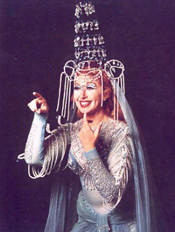
04 Jul 2007
RIMSKY-KORSAKOV: Coq d'Or
The Golden Cockerel [Zolotoy petushok (Le coq d’or)], a dramatized fable with a prologue, three acts and an epilogue.
Mozart and Salieri, an opera in one act consisting of two scenes.
Nicolai Rimsky-Korsakov (1844-1908), composer. Libretto derived from Alexander Puskhin's play of the same name.
First performance: 7 December 1898 in Moscow.
Ariadne auf Naxos, Oper with a prologue and one act. Music composed by Richard Strauss. Libretto by Hugo von Hofmannsthal.
La Vestale, a tragédie lyrique in three acts.
Boris Godunov, an opera in four acts with prologue
Modest Mussorgsky, composer. Libretto by the composer, based on Alexander Pushkin's drama Boris Godunov and Nikolai Karamazin's History of the Russian Empire
First performance: 8 February 1874 at the Mariinsky Theatre, St. Petersburg
Il Trovatore, dramma in four parts.
Only a few months following the premiere of Der Rosenkavalier, Hugo von Hofmannsthal proposed a new opera to Richard Strauss based on Molière’s comedy-ballet, Le Bourgeois gentilhomme (in German, Der Bürger als Edelmann).
Die Entführung aus dem Serail, Singspiel in 3 Acts.
Music composed by Wolfgang Amadeus Mozart (1756–1791). Libretto by Johann Gottlieb Stephanie the Younger, based on an earlier libretto by
Christoph Friedrich Bretzner.
Die Entführung aus dem Serail, Singspiel in 3 Acts.
Music composed by Wolfgang Amadeus Mozart (1756–1791). Libretto by Johann Gottlieb Stephanie the Younger, based on an earlier libretto by
Christoph Friedrich Bretzner.
Arabella: Lyrische Komödie in three acts
Die Entführung aus dem Serail, Singspiel in 3 Acts.
Music composed by Wolfgang Amadeus Mozart (1756–1791). Libretto by Johann Gottlieb Stephanie the Younger, based on an earlier libretto by
Christoph Friedrich Bretzner.
La Gioconda, dramma lirico in four acts.
Music composed by Amilcare Ponchielli (1834–1886). Libretto by Arrigo Boito (under the pseudonym Tobia Gorrio), based upon Victor Hugo's Angelo, Tyrant of Padua (1835).
Don Carlo, an opera in four acts. Music composed by Giuseppe Verdi (1813–1901). Libretto by Joseph Méry and Camille Du Locle after Friedrich von Schiller’s dramatic poem Don Carlos, Infant von Spanien. Revised version in four acts (French text revised by Du Locle, Italian translation by Achille de Lauzières and Angelo Zanardini).
Un ballo in maschera, a melodramma in three acts.
Music composed by Giuseppe Verdi. Libretto by Antonio Somma, based upon the work of Eugène Scribe Gustave III ou Le bal masqué (1833)
Medea: Melodramma tragico in three acts.
Die Tote Stadt, an opera in three acts.
Music composed by Erich Wolfgang Korngold (1897-1957). Libretto by Paul Schott (Julius and E. W. Korngold) after the novel Bruges la morte by Georges Rodenbach.
Some Details concerning the Revolution inaugurated by Rossini
Manon Lescaut, dramma lirico in quattro atti
Elektra: Tragedy in one act.
Lyric Opera of Chicago has announced both schedules and cast-lists for is Spring 2020 performances of Richard Wagner’s Ring Cycle. Given the series of individual productions already staged by the company since Fall 2016, that pave the way for the complete cycle, Lyric Opera of Chicago’s complete production should affirm the artistic might of the great composer.
“Diacono himself does not know what musical talent he possesses” – Mascagni

The Golden Cockerel [Zolotoy petushok (Le coq d’or)], a dramatized fable with a prologue, three acts and an epilogue.
Streaming Audio
Music composed by Nicolai Rimsky-Korsakov (1844–1908). Libretto by Vladimir Nikolayevich Bel’sky, based on Alexander Pushkin’s treatment of stories from The Alhambra by Washington Irving (rev. ed., 1851).
First Performance: 24 September 1909, Solodovnikov Theatre, Moscow.
| Principal Characters: | |
| King Dodon | Bass |
| Prince Guidon | Tenor |
| Prince Afron | Baritone |
| Commander Polkan | Bass |
| Amelfa, royal housekeeper | Contralto |
| Astrologer | Tenore-Altino |
| The Queen of Shemakha | Soprano |
| The Golden Cockerel | Soprano |
Synopsis:
The bumbling King Dodon talks himself into believing that his country is in danger from the neighbouring State governed by the beautiful Queen Shemakhan. He asks for advice from a mysterious Astrologer, who gives him a magic Golden Cockerel, which promises to look after his interests.
The Golden Cockerel confirms that Queen Shemakhan certainly has some territorial ambitions, so King Dodon foolishly decides to make a pre-emptive strike against the neighbouring State, and sends his army, led by his two sons, to start the battle. However, his sons are both so inept that they manage to kill each other on the battlefield.
King Dodon then decides to lead the army himself, but further bloodshed is averted because the Golden Cockerel ensures that the old king becomes besotted when he actually sees the beautiful Queen. The Queen herself encourages this situation by performing a seductive dance - which tempts the King to try and partner her, but he is clumsy and makes a complete mess of it.
The Queen realises that she can take over Dodon’s country without further fighting — she engineers a marriage proposal from Dodon, which she coyly accepts.
The final scene starts with the great Bridal procession in all its splendour - and when this is reaching its conclusion, the Astrologer appears and says to the king “You promised me anything I could ask for if there could be a happy resolution of your troubles.......” “Yes, Yes, “ said the king, “Just name it and you shall have it”. “Right,” said the Astrologer, “I want Queen Shemakhan!”. At this, the King flares up in fury, and strikes down the Astrologer with a blow from his mace. The Golden Cockerel, loyal to his Astrologer master, then swoops across and pecks through the King’s jugular.